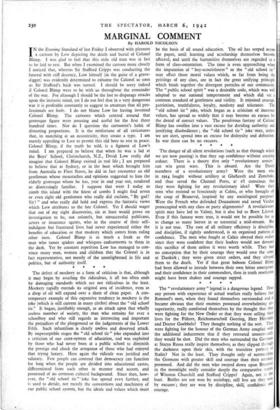The danger of all silent revolutions (such as that through
which we are now passing) is that they sap confidence without creating ardour. There is a theory that only " revolutionary armies" can win great wars. This is absurd. Are -the Dutch members of a revolutionary army? Were the men who in 1914 fought without artillery at Gheluvelt and Zonebeke, and thus saved the Channel Ports, at all conscious that they were fighting for any revolutionary idea? Were their sons. who resisted so ferociously at Calais, or who brought of the coup of Bruneval, inspired by any sociological purpose? Were the French who defended Douaumont and saved Verdun preoccupied with any class or party alignments? A revolutionary spirit may have led to Valmy, but it also led to Brest Litovsk. Even if this fantasy were true, it would not be possible for us to change so many horses in so torrential a mid-stream. But it is not true. The root of all military efficiency is discipline. and discipline, if rightly understood, is an organised pattern of confidence. The men who fought at Calais obeyed their orders since they were confident that their leaders would not demand this sacrifice of them unless it were worth while. They had no conception that by their courage they would save the army at Dunkirk ; they were given strict orders, and they obeyed them to the death. Yet if that great baboon Colonel Blimr had been allowed to intrude between their own bitter emergency and their confidence in their commanders, then in truth resolution might have been shaken and courage sapped.
* * * *


























 Previous page
Previous page